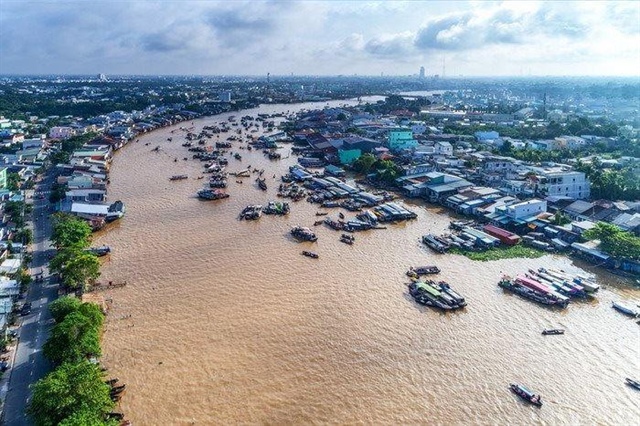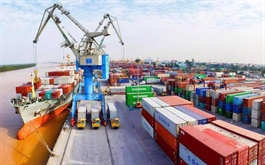Climate change to cost Vietnam 14.5% of GDP by 2050: WB
Climate change to cost Vietnam 14.5% of GDP by 2050: WB
With the right mix of policies and strategies, Vietnam can leverage its decarbonization efforts to advance development objectives so that achieving net zero emissions does not reduce GDP growth.
Without proper adaptation and mitigation measures, it is estimated that climate change will cost Vietnam about 12-14.5% of GDP a year by 2050 and could plunge up to one million people into extreme poverty by 2030.

The Mekong Delta region. File photo |
World Bank Country Director for Vietnam Carolyn Turk gave the remarks at the launch of the Vietnam Country Climate and Development Report (CCDR) today [July 14].
According to Turk, Vietnam with over 3,200 kilometers of coastline and many low-lying cities and river delta regions, is one of the most vulnerable countries in the world to climate change.
“Vietnam aims to become a high-income economy by 2045 following remarkable economic development over the past two decades, but this ambition could be undermined by climate change,” Turk said.
Giving a more detailed look at the case, Muthukumara Mani, World Bank’s Lead Environmental Economist, noted Vietnam’s rapid economic growth, urbanization, and industrialization have been powered by coal-dependent energy that creates significant greenhouse gas (GHG) emissions.
“Vietnam is not a major contributor of GHGs globally, with 0.8% of the world’s emissions. But over the past two decades, the country has emerged as one of the fastest-growing GHG emissions per capita in the world,” Mani said.
From 2000 to 2015, as GDP per capita increased from $390 to $2,000, carbon dioxide (CO2) emissions nearly quadrupled. Moreover, Vietnam’s GHG emissions are associated with the toxic air pollution that plagues many of its cities, especially Hanoi, with implications for human health and labor productivity, he added.
Climate change impacts – mainly higher and more variable temperatures and sea level rise – are already disrupting economic activity and undermining growth. Initial calculations suggest that Vietnam lost $10 billion in 2020, or 3.2% of GDP, to climate change impacts, Mani stated.
According to Mani, the damage will vary across regions. In the North, rising temperatures are likely to trigger productivity losses caused by heat stress and shorter plant growth cycles, with severe water shortages curbing annual yields. In the Central region, coastal areas and cities will be increasingly exposed to flooding from typhoons and tropical storms.
Meanwhile, in the South, the vast Mekong Delta region--where much of the nation’s rice, fruit, and fish are harvested--is particularly at risk from rising sea levels. Almost half the delta will be inundated if sea levels climb by 75 to100 centimeters above 1980–99 averages, threatening economic losses from increased salinity and rendering the production of some crops impossible.
Pathways forward
To counter these trends, Mani called for Vietnam to embrace a new development paradigm based on two connected pathways—to adapt to climate change and build resilience, and to mitigate climate change by decarbonizing growth and steering the economy away from carbon-intensive energy.
“If well designed, these two pathways will help the country achieve its climate objectives while expanding its GDP per capita by more than 5% per year—the average rate needed to become high-income by 2045,” he said.
Mani said such a positive outcome would require investments of up to $368 billion between 2022 and 2040 to finance spending on infrastructure, new technologies, and social programs to ensure a “just transition” toward a net-zero emission and climate-resilient economy.
“These financing needs, however, are lower than the damages from climate change and rising GHG emissions,” Mani noted, saying this can be funded by a combination of domestic and international financial sources.
Jacques Morisset, World Bank’s Lead Economist and Program Leader, stressed for Vietnam to accelerate its transition to a low-carbon economy and achieve its development objectives to become a high-income country by 2045, the country must move as early as possible through the implementation of a series of urgent and most impactful interventions.
This would include a coordinated regional program for the Mekong Delta.
A clear roadmap to ensure a more resilient economy will protect the country’s private assets, public infrastructure, and people, he said.
Adaptation measures should focus on the country’s most vulnerable sectors and locations, particularly agriculture, transport, trade/industry, coastal areas, and the Mekong Delta region.
He referred to an integrated coastal resilience investment program for urban centers and connecting infrastructure, a targeted air pollution reduction program for Hanoi agglomeration, and an accelerated energy transition process.
“Such measures will immediately and significantly contribute to the country’s efforts to adapt and mitigate risks from climate change,” Morisset said.
Morisset also expects they would help the Government build momentum for reforms and ensure a just transition for most citizens.

























